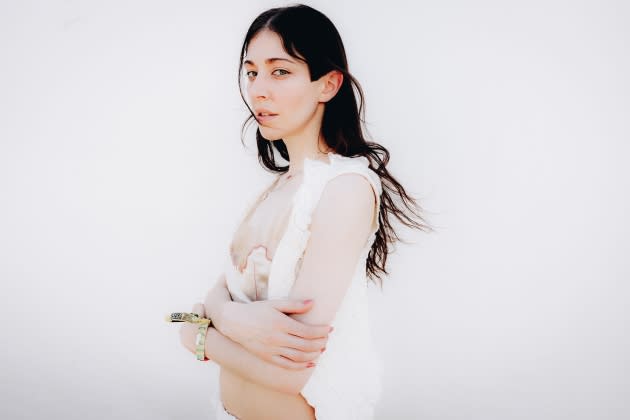How Sophie and Dua Lipa Taught Caroline Polachek About Her Place in Pop
- Oops!Something went wrong.Please try again later.

When Caroline Polachek joined Dua Lipa for select dates on the Future Nostalgia tour, there was no room for error. In a recent interview with Pitchfork, the singer compared the run-of-show to a “military operation,” one in which every second of her half-hour long set had to count. Convinced she was going to be bored of the trek after two weeks, Polachek emerged from the experience as a stronger artist and performer — but she makes clear that it didn’t make her a diva.
“It was actually not so much a musical challenge but a physical challenge — of holding that much space with my body. I got really into it, testing out different ways of moving or holding my face,” she explained. “It was quite a psychedelic assignment, because on most people’s optical field, I’m like a tiny ant in a 20,000-person arena. But at the same time, my face was massive on the screens. So it was having to be really huge with my body movements and really precise with my facial movements, down to little things about where my eye movements look and which lyrics I’m responding to facially.”
More from Rolling Stone
Caroline Polachek Dances on Her Own for 'Welcome to My Island' Performance on 'Fallon'
Caroline Polachek's 'Desire, I Want To Turn Into You' Is An Impressive Pop-Science Flex
Hit Songwriters Tell All, from Thieving Artists to Grammy Snubs
She added: “It was an experiment for me, learning how to get not just much more comfortable, but really articulated and juicy and having fun in my performances. We played an almost-20,000-person show of our own at Primavera [after the tour], which would have been terrifying to me if I hadn’t come off the back of shows at the same scale. It gave me a lot of confidence.”
In February, Polachek embarked on her own headlining tour in support of Desire, I Want to Turn Into You, her fourth studio album, and Pang, the predecessor she never had a chance to tour on because of the pandemic. The trek arrives to North America on April 14. During rehearsals for the stretch of shows, Polachek said, “I’d be ducking out of rehearsal to go hear new mixes and masters [of the album] as they came in, write down notes, and go back into rehearsal for songs before we even had mixdowns to work with.”
She started recording the album while on the Future Nostalgia tour, beginning at 9 a.m. and going until it was time for her to hit the stage. “The funny thing was, that on that tour, I was like, ’I don’t know if what we’re making is that good. I don’t know if this has anything to do with the album,’” Polachek told Rolling Stone late last year. “And then, in hindsight, that’s my favorite stuff.”
One of the setlist staples, a deep cut on the album titled “I Believe,” brought to mind another immovable figure in pop music who informed Polachek’s own approach to the genre. Where the Dua Lipa tour taught her about holding her body in an expansive space, the avant-pop producer Sophie was — before her sudden death — a living lesson in capturing the essence of being a pop diva without falling into any of its stereotypes.
“I started thinking about it in a more spiritual way, about what a diva really means, and there are two essential things. The diva is essentially a woman character and not a girl. There’s this sense of commanding strength of adulthood in it rather than, like, sexy ingenue. It’s very different,” she explained. “The second thing is that the diva inherently holds this contradiction of being able to destroy and heal at the same time. That’s what makes a diva so precarious. Like, you serve her the wrong kind of champagne, and she will cancel the gig. Also, she has the power to make every single person in that room be at peace with themselves. You have the power to do both.”
It was while creating “I Believe” that Polachek realized her diva description perfectly mirrored Sophie. “She had so many contradictions within her and within her music, and even how she existed as an artist. I wanted to not only dedicate that song to her, but embody those contradictions myself,” she added. “Ultimately, this song is about protection, protecting someone. It’s about faith—you believe that you’ll never be apart — and it’s about immortality, that someone’s legacy and what they do here can go on.”
Best of Rolling Stone
